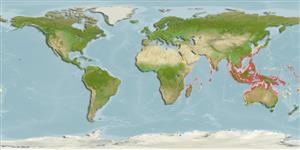Common names from other countries
Elasmobranchii (Haie und Rochen) (sharks and rays) >
Carcharhiniformes (Ground sharks) >
Atelomycteridae (Coloured catsharks)
Etymology: Atelomycterus: ateles (Gr.), imperfect, unfilled or exempt; mycteros (Gr.), nostril, referring to lack of posterior nasal valve. (See ETYFish); marmoratus: Latin for marbled, referring to white blotches over large black spots and bars. (See ETYFish).
Environment: milieu / climate zone / depth range / distribution range
Ökologie
seewasser riff-verbunden. Tropical
Indo-West Pacific: Pakistan and India to Malaysia, Singapore, Indonesia, New Guinea, Thailand, Viet Nam, the Philippines, southern China; north to Japan.
Length at first maturity / Size / Gewicht / Alter
Maturity: Lm ?, range 49 - ? cm
Max length : 70.0 cm TL Männchen/unbestimmt; (Ref. 244)
Rückenflossenstacheln (insgesamt): 0; Rückenflossenweichstrahlen (insgesamt): 0; Afterflossenstacheln 0; Afterflossenweichstrahlen: 0. Saddle markings obsolete, light grey and white spots outlined by large black spots, bars and lines (Ref. 11146).
A common but little-known inshore shark found on coral reefs and though to inhabit crevices and holes on reefs (Ref. 11146). Oviparous (Ref. 50449). Caught occasionally by various fisheries operating over coral reefs and probably adversely affected by dynamite fishing (Ref.58048). Utilized fresh and dried-salted for food or processed for fishmeal and oil (Ref. 244).
Life cycle and mating behavior
Geschlechtsreife | Fortpflanzung | Ablaichen | Eier | Fecundity | Larven
Oviparous, with single egg-cases laid per oviduct (Ref. 244). Embryos feed solely on yolk (Ref. 50449).
Compagno, L.J.V., 1984. FAO Species Catalogue. Vol. 4. Sharks of the world. An annotated and illustrated catalogue of shark species known to date. Part 2 - Carcharhiniformes. FAO Fish. Synop. 125(4/2):251-655. Rome: FAO. (Ref. 244)
IUCN Rote Liste Status (Ref. 130435)
CITES (Ref. 128078)
Not Evaluated
Nutzung durch Menschen
Fischereien: kleinfischerei
Mehr Information
ReferenzenAquakulturAquakultur ProfilZuchtlinienGenetikElectrophoresesVererbbarkeitKrankheitenVerarbeitungMass conversion
PartnerBilderStamps, Coins Misc.LauteCiguateraGeschwindigkeitSchwimmstilKiemenoberflächeOtolithsGehirngrößeSehfähigkeit
Tools
Zusatzinformationen
Download XML
Internet Quellen
Estimates based on models
Preferred temperature (Ref.
115969): 25.3 - 29.3, mean 28.6 (based on 2581 cells).
Phylogenetic diversity index (Ref.
82804): PD
50 = 0.5156 [Uniqueness, from 0.5 = low to 2.0 = high].
Trophic level (Ref.
69278): 3.8 ±0.3 se; based on size and trophs of closest relatives
Widerstandsfähigkeit (Ref.
120179): niedrig, Verdopplung der Population dauert 4,5 - 14 Jahre. (Fec assumed to be <100).
Fishing Vulnerability (Ref.
59153): Moderate to high vulnerability (48 of 100).
